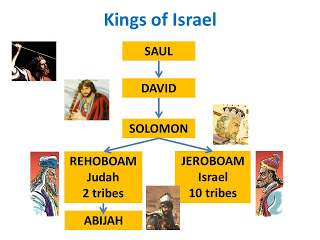Kings: Abijah of Judah
1. HOOK: Prepare a plastic chair. Get a volunteer to come forward and put a hand on the chair. Get the volunteer to...
1. HOOK:
- Prepare a plastic chair. Get a volunteer to come forward and put a hand on the chair. Get the volunteer to lift up the outside leg and lean towards the chair. The chair would move (control it a bit for younger kids), and the kid would lose balance.
- Then get another volunteer to come forward. Get this volunteer to put a hand on the wall and lean towards the wall. The wall doesn’t move, and the kid doesn’t lose balance.
- Today we’re going to learn about somebody who put His trust in the Lord. He didn’t put his trust in other things (like numbers or his own strength and power), because those are like the plastic chair. If you lean on it, it may fail and you may fall. But if we trust the Lord, he is firm, like the wall.
2. LESSON: King Abijah of Judah (1 Kings 15, 2 Chronicles 13)
- REVIEW: KINGS OF ISRAEL

- So far, we have learnt:
- Rehoboam: Solomon’s son. Did not want to serve the people. People rebelled, and the kingdom was split into 2 — Israel and Judah. Rehoboam ruled over Judah.
- After Rehoboam died, his son Abijah succeeded him as king of Judah. He ruled Judah for 3 years.
- What else do we know about Abijah?
- The Bible records for us 2 main things in 1 Kings 15:
- Abijah did not have a WHOLE HEART like King David. He only had HALF HEART. He committed the sins of his father and grandfather of worshipping other gods etc.
- There was war between Abijah and Jeroboam (King of Israel) throughout Abijah’s lifetime.
- THE WAR (2 Chron 13)
- One day, Jeroboam wanted to attack Abijah. He had 800,000 soldiers on his side.
- Abijah got his troops ready too. But he only had 400,000 soldiers.
- Who had the bigger army? Jeroboam (by double the number of troops)
- Who would most probably win? Jeroboam
- God’s ways are not our ways. He delights to show His power in our weakness. (1 Cor 1:25)
- Although we read that Abijah only had HALF HEART for God, he knew and understood that the ONLY way to win against his enemy was to fully rely on God. Not on numbers or his own strength or power.
- Abijah was facing a huge enemy and he knew enough about God that he knew the only way he could win this battle was if God fought it for him.
- THE SPEECH
- Abijah stood on the mountain and gave a speech to Jeroboam and his soldiers. His speech included:
- Reminding them of God’s promise to David that his kingdom would reign forever.
- Jeroboam made golden calves to be their gods and drove out God’s priests from his kingdom and allowed anyone who wants to be a priest to be one. (our lesson last week)
- Abijah’s kingdom had God’s priests who were obedient to follow God’s ways to worship.
- God is with Judah and enemies will lose if they fight against Him. “People of Israel, do not fight against the Lord, the God of your ancestors, for you will not succeed.” (2 Chron 13:12)
- THE AMBUSH
- But Jeroboam decided to go ahead.
- He sent some of his troops behind Abijah’s troops to “sandwich” them.
- When Judah turned and saw that there were Jeroboam’s armies in front AND behind them, they did the only thing they could do — they cried out to the Lord.
- The priests blew their trumpets. The men of Judah raised the battle cry.
- And even though Israel’s armies were 2x the size of Judah’s, the Bible records for us that God defeated the armies of Israel before King Abijah and Judah.
- Israel’s armies fled, and Abijah and his men managed to strike down 500,000 of them. Imagine … 400,000 soldiers from Judah striking down 500,000 soldiers from Israel. Physically and logically, that was impossible. But God made it possible.
- In 2 Chronicles 13:18, it says, “The Israelites were subdued on that occasion, and the people of Judah were victorious because they relied on the Lord, the God of their ancestors.”
- Conclusion:
- Even though Abijah did bad things, the one good thing he did was to remember God’s promise/covenantto his great grandfather, David.
- He knew that God promised to give King David a forever kingdom.
- He knew God always kept His promises.
- So he knew God would not fail them.
- Even as a little boy, Abijah’s great grandfather, David, also remembered God’s promise/covenant to the people of Israel (e.g. the Abrahamic covenant of a great nation).
- When he saw Goliath mocking the armies of Israel, he said, “Who is this uncircumcised Philistine that he should defy the armies of the living God?” (1 Sam 17:26)
- When Goliath insulted him, David said, “You come against me with sword and spear and javelin, but I come against you in the name of the Lord Almighty, the God of the armies of Israel, whom you have defied.” (1 Sam 17:45)
- David knew who was with Israel and who will fight the battle for them — God.
- God is a Covenant-keeping God.
- God kept His covenant when Goliath was threatening His people
- God kept His covenant with David when Jeroboam’s armies tried to ambush Abijah’s
- God didn’t help Abijah and Judah because they were so good or that they deserved it — even though Abijah boasted, “We are observing the requirements of the Lord our God.”
- God helped Abijah and Judah because of His covenant with David — “For David’s sake, the Lord his God gave him a lamp in Jerusalem by raising up a son to succeed him and by making Jerusalem strong.”
- And God keeps His covenant with Jesus, which was cut on the cross with Jesus’ blood.
- God will help us in our time of need — not because we deserve it; not because we are so good; but because He is good, and because we are His children under the New Covenant.
- For Jesus’ sake, God fights our battles for us. God protects us. God helps us and gives us the victory!
- Praise the Lord!
- Memory Verse:
o 2 Chron 13:18 The people of Judah were victorious because they relied on the Lord, the God of their ancestors.
Option:
o Ps 18:2 The Lord is my rock, my fortress and my deliverer …




